 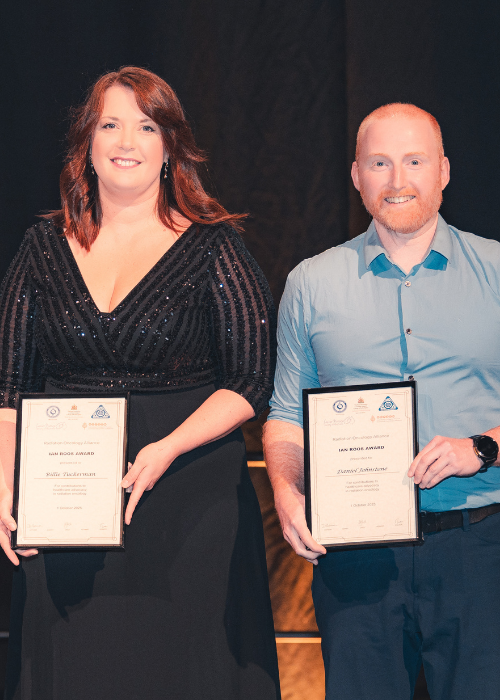   |
Ian Roos Award
Winners: Billie Tuckerman & Daniel Johnstone
We are honoured to receive the Ian Roos Award at the IUPESM Awards. This recognition reflects a shared journey from two perspectives: Dan's, as a young adult cancer patient who underwent proton therapy in his mid-twenties, and Billie's, as a parent advocate navigating treatment options and Proton Therapy on the other side of the world for her daughter. Together these experiences shaped our commitment to improving access to advanced, kinder cancer care in Australia.
We are grateful to the selection committee, clinicians, and scientists, and most of all to the families who continue to share their stories. We acknowledge the progress made to support families who must travel overseas for care, and we remain focused on the next step: building timely, equitable access to proton therapy here at home, alongside the wraparound supports children and families need.
We dedicate this award to the kids and young adults who inspire us, and to the teams who never stop pushing for better outcomes. Thank you for standing with us.
|
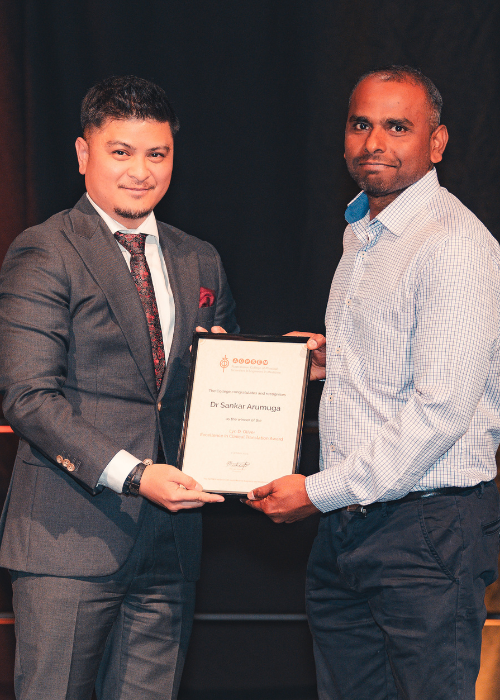 |
Lyn D. Oliver am Excellence in Clinical Translation Award
Winner: Sankar Arumugam
I am deeply honoured to receive ACPSEM Clinical Translation Award 2025. I have always been passionate about advancing and improving patient care and experience through translational research, in an equitable way that benefits all patients regardless of their socioeconomic background.
Receiving this award in the name of A/Prof Lyn D. Oliver is especially meaningful to me. I had the privilege of meeting Prof. Oliver a few times the first was in 2008, soon after my arrival in Australia, at a medical physics boot camp for accreditation. Our conversation was truly inspirational, and I feel privileged to follow in his legacy of improving patient care.
My sincere thanks to Dr Mark Sidhom for his constant support and encouragement, to my nominators for recognising my contributions, and to my wonderful family for their unwavering support that allows me to continue pursuing my passion.
|
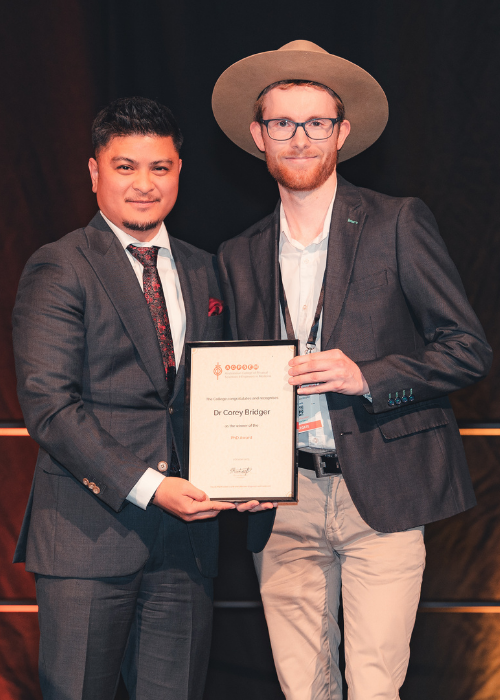 |
PhD Award
Winner: Corey Bridger
I don't think anyone was more shocked than I was on the night when I saw my name appear on the screen! Felt like such an honour that my peers regarded my PhD work as highly as they did.
I would like to thank the ACPSEM, Better Healthcare Technology Foundation, and of course Professor Tomas Kron, who continues to sponsor this award. To my close friends and family who kept me going throughout my research journey, you're the best! To all my colleagues who've had to endure years of listening to me repeat the same talk over and over again (finally it can stop!) And of course, to my academic supervisors, for whom none of this would have been possible without: A/Prof/ Alexandre Santos, Dr. Paul Reich, and special thank you to A/Prof. Michael Douglass. Hopefully I have shown that making this project into a PhD instead of an honours project was the right decision!
|
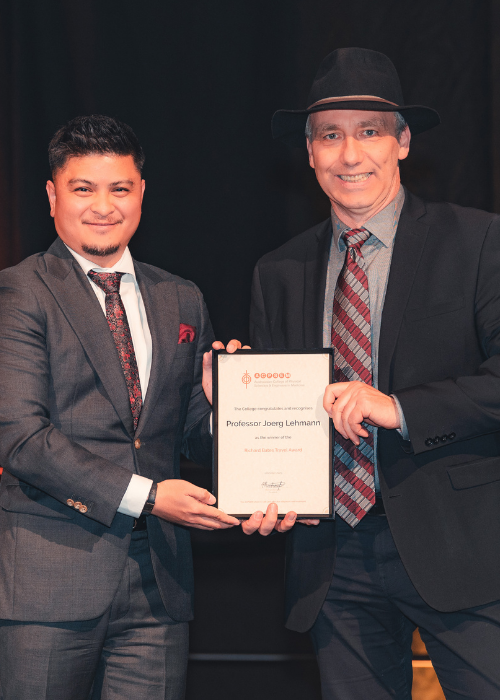 |
Richard Bates Travel Grant
Winner: Joerg Lehmann
I am excited and grateful for receiving this year’s ACPSEM Richard Bated Travel Award. I will undertake a collaborative visit to the Radiation and Nuclear Safety Authority (STUK) in Finland. Following earlier discussions and an invitation from Senior Physicist Ilkka Jokelainen, my visit will focus on exchanging expertise in dosimetry audits, a critical component of quality assurance in radiation therapy. The program of the visit will include discussions about technical, logistical, and financial aspects of the Finnish dosimetry audit program and participation in a live audit at a radiation therapy centre in Turku, Finland. In exchange, I will present on Australian audit initiatives, including the Australian Clinical Dosimetry Service (ACDS), the Virtual EPID Standard Phantom Audit (VESPA) and our work assessing sensitivity of clinical patient specific quality assurance (PSQA) systems through purposefully introduced errors (SEAFARER).
The travel is expected to help with further improving the Australian dosimetry audit landscape, to strengthen international collaborations, and to contribute to the advancement of medical physics practice.
|
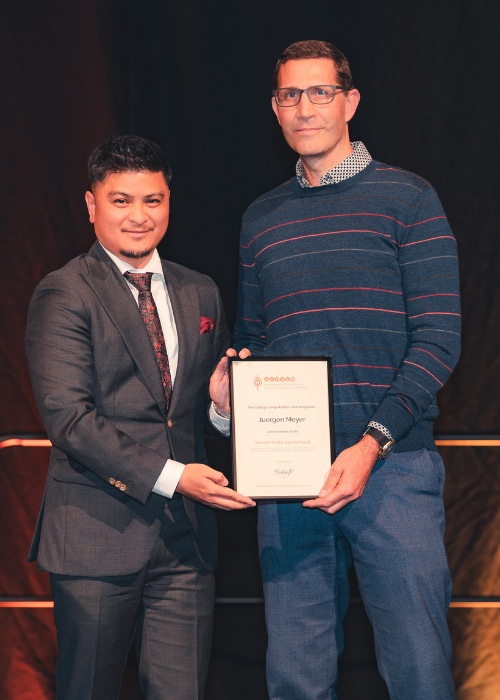 |
Kenneth Clarke Journal Award 1
Winners: Juergen Meyer, Alicia Moggre, Steven Marsh & Jackson Roberts
Paper: Simulation-guided development of an optical calorimeter for high dose rate dosimetry. Physical and Engineering Sciences in Medicine (2024) 47:143151
Winning the Kenneth Clarke Journal Award was a truly special honor, especially given the consistently high caliber of articles published in PESM. We’re deeply grateful to the editors for their thoughtful consideration. The awarded paper showcases pioneering research in Optical Calorimetry for Radiation Dosimetry, a distinctive and underexplored field that merges laser optics with radiation calorimetry to enable precise spatial and temporal dose quantification in radiotherapy without the need for intrinsic correction factors. The achievement is particularly meaningful given that the research was conducted as part of a part-time PhD, undertaken alongside demanding clinical responsibilities as a medical physics registrar. We, as Jackson’s supervisory team, are incredibly proud that his scientific excellence, innovation, and dedication have been recognized in this way.
|
 |
Kenneth Clarke Journal Award 2
Winners: Leah Biffin, Rick Franich & Chris Williams
Paper: A model for estimating peak skin dose in CT. Physical and Engineering Sciences in Medicine (2024) 47:539550
This project was conceived and overseen by Leah Biffin at Western Health, and conducted primarily by Chris Williams as a Master's student in the Medical Physics program at RMIT University under the supervision of Prof Rick Franich. In publishing this work, we aimed to create a tool of genuine practical value to diagnostic physicists working clinically.
At this very early career stage, Chris demonstrated a very high degree of independence and scientific direction as the project evolved. Chris is an outstanding example of the important contributions to medical physics being made by talented students in Master's programs and academic-clinical research partnerships across Australasia.
We are thankful for the recognition of the value of this work, both in the form of this award from the Editorial Board of PESM, and the very positive feedback received directly from the professional community who have found our work both useful and valuable.
|
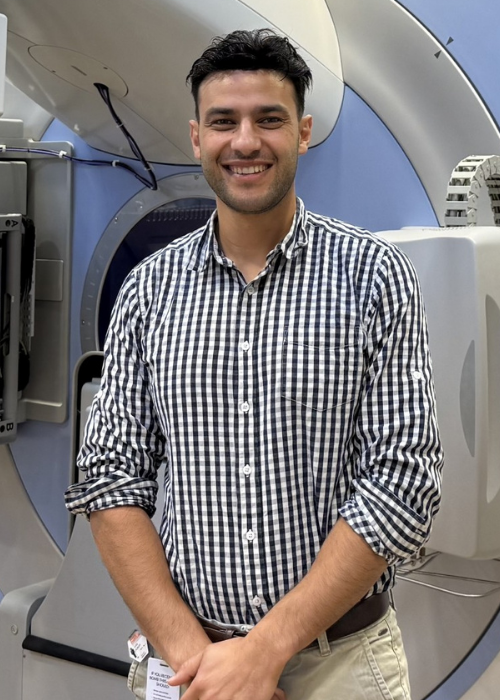 |
Boyce Worthley Young Achievers Award
Winner: Saree Alnaghy
I am deeply honoured to receive the Boyce Worthley Award. This recognition reflects the incredible mentors, colleagues, and collaborators who have supported and inspired me throughout my career.
|
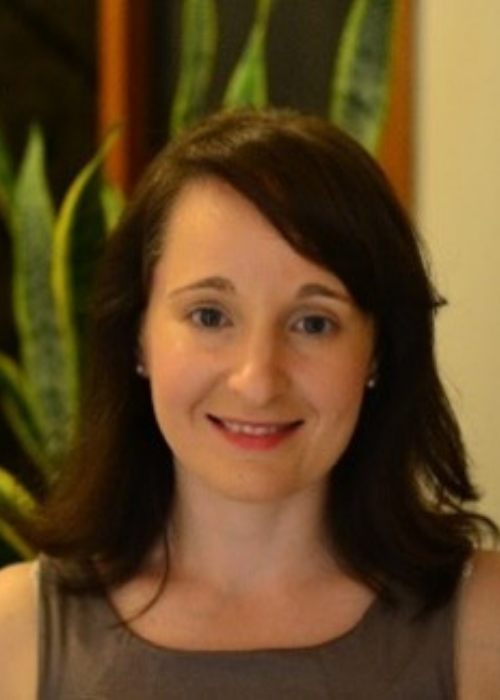 |
Vera Page Last Award For Excellence in Clinical Leadership
Winner: Zoe Moutrie
Thank you. I feel incredibly honoured to have been selected for the BHT Foundation Clinical Leadership Award, created in memory of Vera Page Last and her pioneering work in patient-centred innovation. This recognition highlights the vital role clinicians play in bringing safer, more effective technologies to the people we serve.
For those of us in patient-facing roles, balancing heavy clinical schedules, remote or rural practices, and caregiving responsibilities can make access to new opportunities a real challenge. Being acknowledged by this award validates our daily efforts and demonstrates that true innovation happens when clinical insights drive technology forward.
I accept this honour not just for myself, but on behalf of the incredible multidisciplinary team I’ve had the privilege to work alongside. The positive change we’ve achieved—particularly for our culturally and linguistically diverse (CALD) patient population—was only possible through their dedication, creativity, and shared commitment to compassionate care. This award is a reflection of what we can accomplish together.
May the Vera Page Last Clinical Leadership Award inspire us all to keep collaborating, keep questioning, and keep placing patient needs at the heart of every advancement. Thank you.
|
 |
Distinguished Service Award
Winner: Simon Downes
I am deeply honoured to receive this award and would like to extend my heartfelt thanks to everyone involved. For my work with APSIG, I have to acknowledge the amazing contributions by the volunteers that have dedicated their time (remotely and on leave) to help train radiotherapy staff in the many SE Asian countries over the past 15 years. APSIG can stand proud of what it has achieved because of our volunteers and this award reinforces my commitment to continue our activities.
|
 |
Distinguished Service Award
Winner: Jamie Trapp
It was a great honour to receive the award and thank you to everybody involved. I have been supported by teams of excellent collaborators and colleagues who will always be greatly appreciated
|
 |
Life Time Member
Professor Richard Jones
I wish to say how honoured I am to have been recognised by way of having been awarded Life Membership of the College.
A bit of selected history: My introduction to biomedical engineering was way back in 1973, when, having gained my BE (Hons) in Electrical & Electronic Engineering at University of Canterbury, I was awarded a summer studentship in the Department of Medical Physics & Bioengineering at Christchurch Hospital. After gaining my ME in Feb 1975, I was offered a permanent position in MPBE by HOD Jack Tait and a career in biomedical engineering was settled. I was involved in R&D in lots of clinical areas but it was neurology and rehabilitation which gave me my life-long fascination in the human brain, its disorders, and neuroscience. This led, via part-time study, to a PhD in Medicine from the University of Otago, and, later on, to a central role in the establishment of the New Zealand Brain Research Institute in 2004, in particular as Director of the Christchurch Neurotechnology Research Programme.
More specifically re my research interests and contributions, these largely fall within neural engineering and the neurosciences, particularly within (i) human performance engineering in brain disorders (stroke, Parkinson’s disease, Alzheimer's disease, traumatic brain injury, stuttering) and driver assessment, (ii) lapses of responsiveness (microsleeps, attention lapses, mind blanks) via characteristics, brain mechanisms (fMRI+EEG+Tracking+EyeClosure), and detection from behavioural measures and EEG, (iii) signal processing in clinical neurophysiology via detection of epileptic activity, (iv) eye movements in brain disorders, (v) neural control and rehabilitation in swallowing disorders, (vi) adverse effects of sleep apnea on the brain, and (vii) forensic brainwave analysis.
Regarding the ACPSEM, I became a Member in 1979 and was made a Fellow in 1995. I was Chair of the NZ Branch 1993-1994, Vice-President 1993-1995, President 1996-1997, and Immediate Past President 1998-1999. From 2009-2022, I was Coordinator of TEAP for Medical Physics Registrars in MPBE.
Following my retirement from part-time MPBE in 2022, I have been taking life easier while retaining my interest and involvement in brain-related projects. But more time to pursue my interests in tennis (4x/week), wildlife trips & photography, music (listening & guitar), and a walk early every day on the beach with our blue heeler.
|